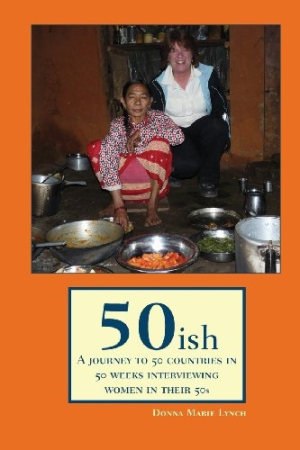50ish
A Journey to 50 Countries in 50 Weeks Interviewing Women in their 50s
Fifty percent insight into fifty world cultures, 50 percent insight into being a woman in her fifties, 100 percent memorable.
Life is never certain. On her fiftieth birthday, Donna Marie Lynch discovered her mother was dying of cancer. Like a struck bell, Lynch was shocked by her mother’s death and by her own mortality. In the wake of her grief, she managed to visit fifty countries in fifty weeks to honor her mother’s legacy by interviewing women in their fifties. This book, 50ish, details her journey and offers keen insight into other cultures and the grieving process.
The fifty theme is memorable and provides the book with structure. After her mother’s diagnosis, Lynch dreamed that she traveled to fifty different countries. It seemed like no coincidence coming just after her fiftieth birthday. Lynch had always wanted to travel, and her mother’s death motivated her to seize life, follow the sun to avoid cold weather, and see the world. This book spans the globe, from Mexico to Costa Rica, among other countries.
The twenty-five questions Lynch used on her journey add consistency and organization to the book. This was a chance to find out about women’s relationships, health, religion, and happiness across cultures. Lynch’s affection for the interviewees is clear in her end-of-chapter descriptions. She does more than simply list the women’s responses to the questions. Instead, she opens each chapter with interesting anecdotes about the countries’ cultures, her tour guides, and her experiences, and she closes each with the interviewee’s name and story. For example, she describes a Turkish woman named Nukhet who is “dressed in casual boat clothes” and “blushes when she tells me she has been with her husband for over twenty years, but only married him a few months ago.”
Simple pleasures take on new meaning. For example, not every interviewee knows her birthday or the joy of a regular hot shower. Land mines, broken-down vehicles, and poverty fill the world. Education, especially for young girls or women, is not an expectation. The author reflects on her privileged life in Canada and calls her island home paradise.
Lynch is able to touch not just on important customs and traditions in the fifty countries but also on ideas about gender. For example, in Morocco, Lynch’s guide cannot approach the women because no man can talk to a female without a male family member’s presence. This is a female-centric book: Lynch asks all the women if they have experienced any menopausal symptoms and touches on common issues like hot flashes.
The cover art does not do this book justice: A low resolution photograph depicts Lynch posed in a typical foreign environment. This was a missed opportunity to highlight the nations and countries experienced. Similarly, some small proofreading errors detract from the experience. Overall, though, the volume provides sharp insight into other cultures while also exploring how to process grief—an ending can also be a beginning.
After hitting the half-century mark, Lynch could have believed her life was half over. Instead, she decided that the best way to honor her mother was to sit up, pay attention, and live life to the fullest.
Reviewed by
Lisa Bower
Disclosure: This article is not an endorsement, but a review. The publisher of this book provided free copies of the book and paid a small fee to have their book reviewed by a professional reviewer. Foreword Reviews and Clarion Reviews make no guarantee that the publisher will receive a positive review. Foreword Magazine, Inc. is disclosing this in accordance with the Federal Trade Commission’s 16 CFR, Part 255.

